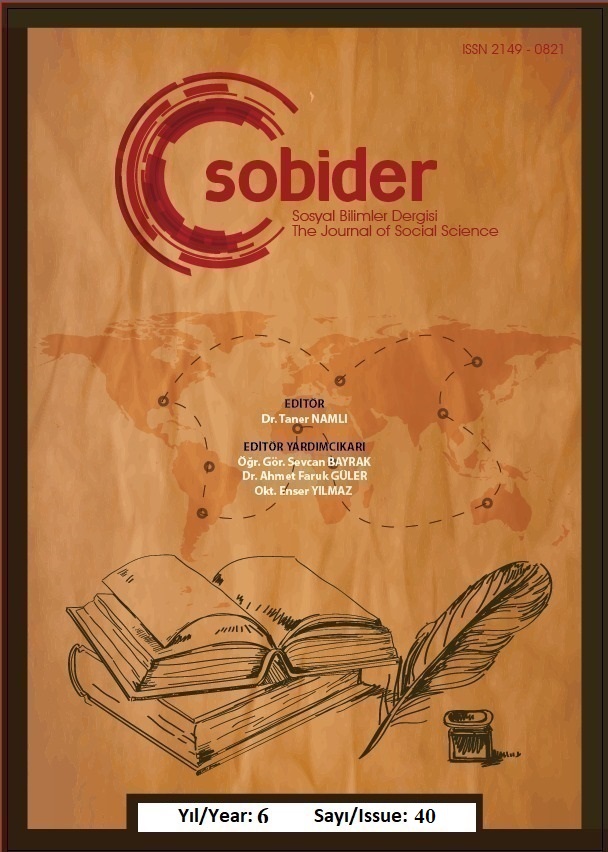Author :
Abstract
Teknoloji dünyasında yaşanan gelişmeler yeni üretim-hizmet sistemlerinin yanı sıra toplumsal açıdan yeni kuşakların da ortaya çıkmasına neden olmuştur. Dolayısıyla geleceğin vizyonu olarak kabul edilen, iş, eğitim ve sosyal hayata yön veren Sanayi 4.0 kavramı 2010 yılında literatüre kazandırılmış insan unsuruna yer vermeksizin makinenin makineyi yönetmesi olarak adlandırılan kavramdır. Teknolojide yaşanan değişim, kuşakların teknolojiyi kullanım şekillerine göre de sınıflandırılmalarına neden olmuştur. Tarihsel gelişmelere paralel olarak adlandırılan kuşaklar son yıllarda teknolojiyi kullanım özelliklerine göre de sınıflandırılmaktadır. Bu sınıflanmalardan bir olan Y Kuşağı 1980-2000 yılları arası doğan milenyum nesil olarak kabul gören kuşaktır. Çalışmada amaç geleceğin insan kaynağını, davranış kalıplarını ve hizmet standartlarını biçimlendiren Y kuşağının biçimleyici rolünü vurgulamaktır. Konuyla ilgili literatür taraması yapılmıştır. Elde edilen bilgiler analiz edilmiş ve yorumlanmıştır. Bu çalışmalar ışığında Y Kuşağının bu yönü ön plana çıkarılmıştır. Bugüne kadar yapılan çalışmalarda her ne kadar Sanayi 4.0 ve Y Kuşağı ilişkisi irdelenmemesine rağmen her iki konunun birbirleriyle ilişkisinin olduğu öngörülmektedir. Bu çalışmanın bundan sonraki araştırmalara öncülük edeceği düşünülmektedir.
Keywords
Abstract
The developments in the world of technology have brought about new production-service systems along with new generations. Hence, the concept of Industry 4.0, which is acknowledged as future vision and guides businesses, education and social life, was introduced to the literature in 2010 and has been referred to as the management of machines by machines independently of human beings. The changes in technology have also resulted in the classification of generations in accordance with their usage of technology. Namely, while generations were named in parallel to historical developments in the past, they have recently been classified in accordance with how they use technology. Being one of these classifications, Generation Y refers to the millennials or the individuals born between 1980 and 2000. The study aims to emphasize the formative role of Generation Y, which shapes the future of human resources, behavioural patterns, and service standards.Subsequent to the literature review, the data were analysed and evaluated, which, in conclusion, featured the formative role of Generation Y. Despite the lack of studies that delve into the relationship between Industry 4.0 and Generation Y, these concepts are predicted to be interrelated. Hence, the study is considered to pioneer future research.
Keywords
- Acatech. (2011). Cyber-Physical Systems: Driving Force for İnnovation mobility, Health, Energy and Production.Acatech(Ed.),Springer-Verlag,Berlin.
- Akgül, B., & Ayer, Z. (2017). Restructurung of Manufacturing Sector Regarding Industry4.0,(Ed.) Bilici, N. Akgül, B. ve Pehlivanlı, R. Global Issues in Social Sciences içinde.
- Akgül, B., & Ayer, Z. (2018). Sanayi 4.0 Sürecinde Medyada Sektörel Dönüşüm. OPUS Uluslararası Toplum Araştırmaları Dergisi, 9(16), 2310-2327.
- Akgül, H., Akgül, B., & Zeynep, A. Y. E.. R. (2018a). Sanayi 4.0 Sürecinde Gazetecilik Sektöründe Çalışacak Personelin Mesleki Yetenek Ve Yeterliliğine Yönelik Değerlendirme Ve Öngörüler. Avrasya Sosyal Ve Ekonomi Araştırmaları Dergisi, 5(8), 198-205.
- Akgül, H., Akgül, B., & Zeynep, A. Y. E. R. (2018b). Sanayi 4.0 Sürecinde Gazetecilik Bölümü Eğitim Programı Oluşturmada Yeni Yaklaşımlar. Avrasya Sosyal Ve Ekonomi Araştırmaları Dergisi, 5(8), 190-197.
- Baldonado, A. M. (2008). 25 Ways to motivate generation Y: A pocket book guide. iUniverse.
- Brettel, M., Friederichsen, N., Keller, M., & Rosenberg, M. (2014). How virtualization, decentralization and network building change the manufacturing landscape: An industry 4.0 perspective. International Journal of Mechanical, Industrial Science and Engineering, 8(1), 37-44.
- Dombrowski, U., & Wagner, T. (2014). Mentalstrain as field of action in the 4th industria lrevolution. Procedia CIRP, 17, 100-105.
- EBSO. (2015). Ege Bölgesi Sanayi Odası, “Sanayi 4.0 Uyum Sağlayamayan Kaybedecek”, Ege Bölgesi Sanayi Odası Dergisi, Ekim 2015.
- Etlican, G. (2012). X ve Y Kuşaklarının Online Eğitim Teknolojilerine Karşı Tutumlarının Karşılaştırılması, İstanbul: İstanbul Üniversitesi SBE Yayımlanmamış Yüksek Lisans Tezi.
- Herman, M., Pentek, T., & Otto, B. (2015). Design principles for Industry 4.0 Scenario: A literaturere view.
- İzmirlioğlu, K. (2008). Konumlandırmada Kuşak Analizi Yardımıyla Tüketici Algılarının Tespiti: Türk Otomotiv Sektöründe Bir Uygulama, Muğla: Muğla Üniversitesi SBE Yayımlanmamış Yüksek Lisans Tezi.
- Kagermann, H., Helbig, J., Hellinger, A., & Wahlster, W. (2013). Recommendations for implementing the strategic initiative INDUSTRIE 4.0: Securing the future of German manufacturing industry; final report of the Industrie 4.0 Working Group. Forschungsunion.
- Landscheidt, S., & Kans, M. (2016). Automation Practices in Wood Product Industries: Lessons learned, current Practices and Future Perspectives. In The 7th Swedish Production Symposium SPS, 25-27 October, 2016, Lund, Sweden. Lund University.
- Lee, J., Bagheri, B., & Kao, H. A. (2015). A cyber-physical systems architecture for industry 4.0-based manufacturing systems. Manufacturing Letters, 3, 18-23.
- Mengi, Z. (2009). “BB, X, Y ve Z Kuşakları Birbirinden Çoook Farklı”. Hürriyet İK, 11 Ekim 2009.
- Mitchell, B. (2005). Understanding and managing different generations. Erişim Tarihi, 10, 2015.
- Porter, M. E.,& Heppelmann, J. E. (2015). How smart, connected products are transforming companies. Harvard Business Review, 93(10), 96-114.
- Sheahan , P. (2006). Generation Y and Surviving: Thriving with GenerationY at Work, Australia: Hardie Grant Books.
- Toker E. (2016). Endüstri 4.0 ve İnsanlığın Geleceği Bilim Dergisi Mart 2016.
- Tulgan, Bruce, Martın, & Carolyn. (2001). Managing Generation Y, US: HDR Press.
- TÜSİAD. (2016) . Türkiye Sanayi ve İşadamları Derneği "Türkiye ‘nin Küresel Rekabetçiliği için Bir Gereklilik Olan Sanayi 4.0 Gelişmekte olan Ekonomi Perspektifi" Yayın No: TÜSİAD-T 2016-03/576 Mart 2016
- Weston, M. J. (2006). Integrating generational perspectives in nursing. OJIN: The Online Journal of Issues in Nursing, 11(2), 1-9.
- Yelkikalan, N. & Altın, E. (2010).”Farklı Kuşakların Yönetimi”, Çanakkale 18 Mart Üniversitesi Yönetim Bilimleri Dergisi, 8(2) .





